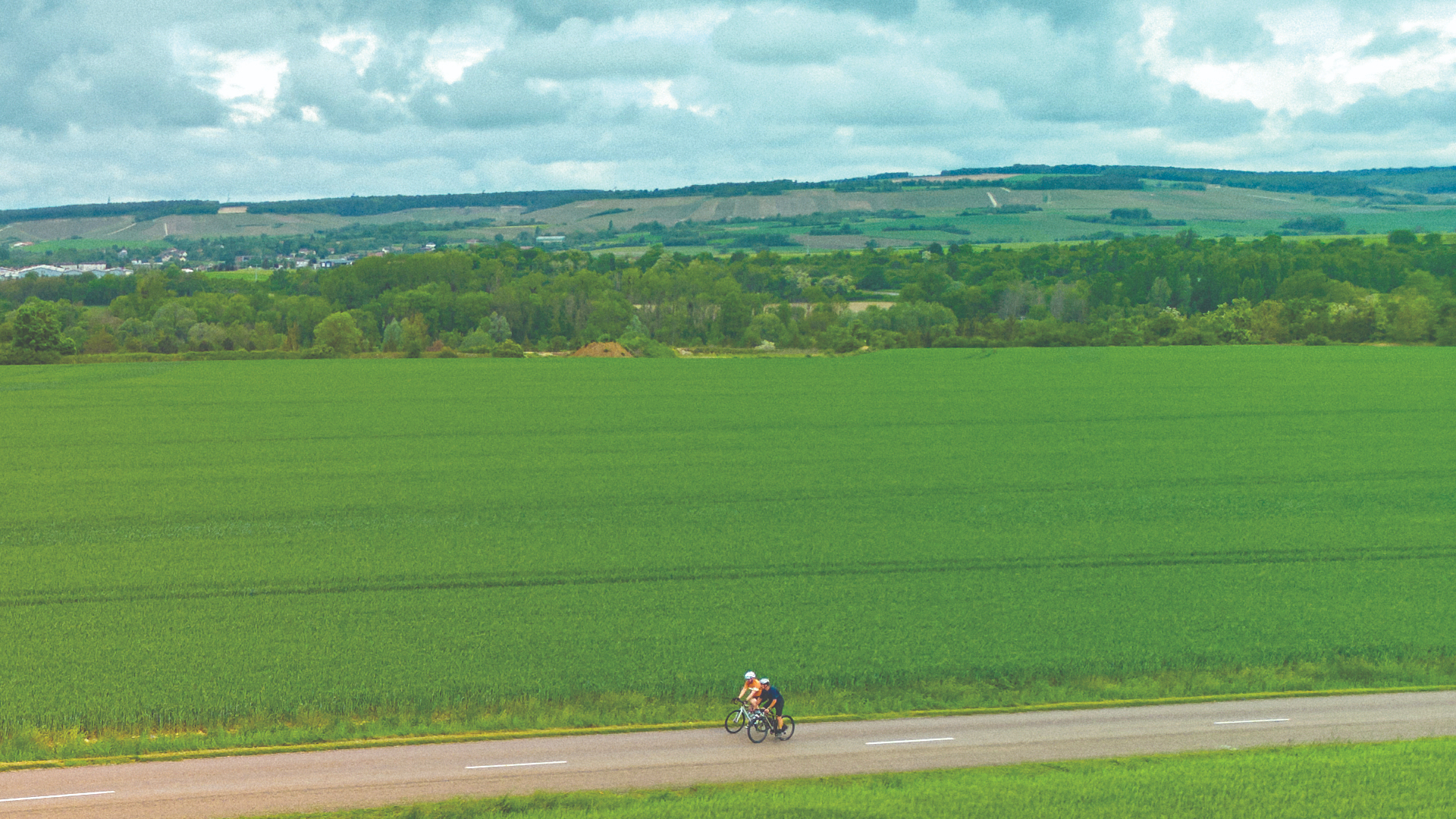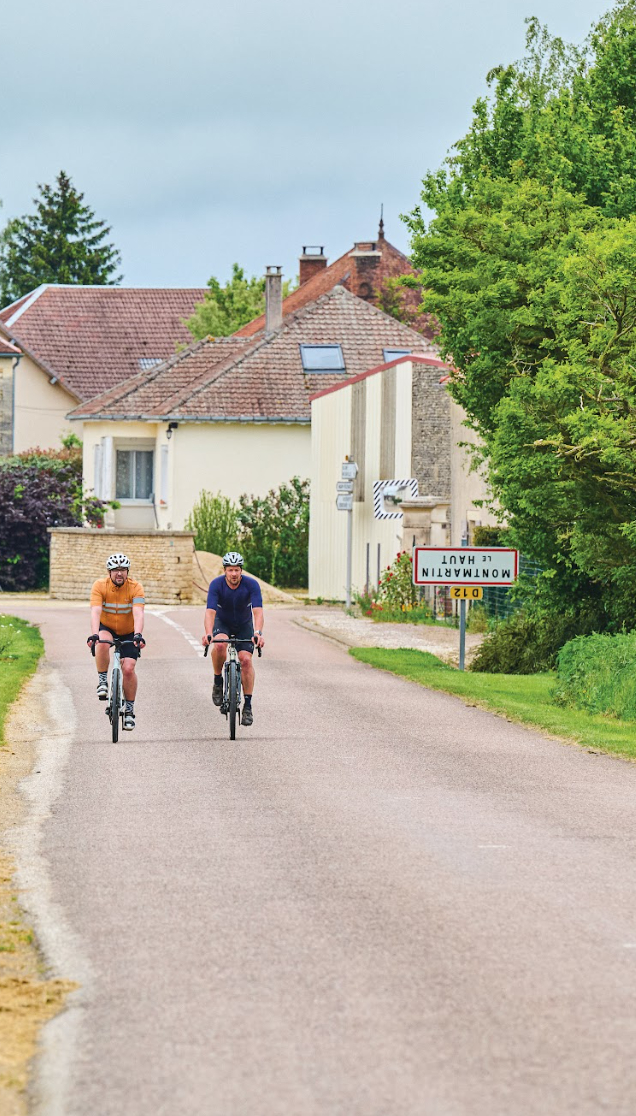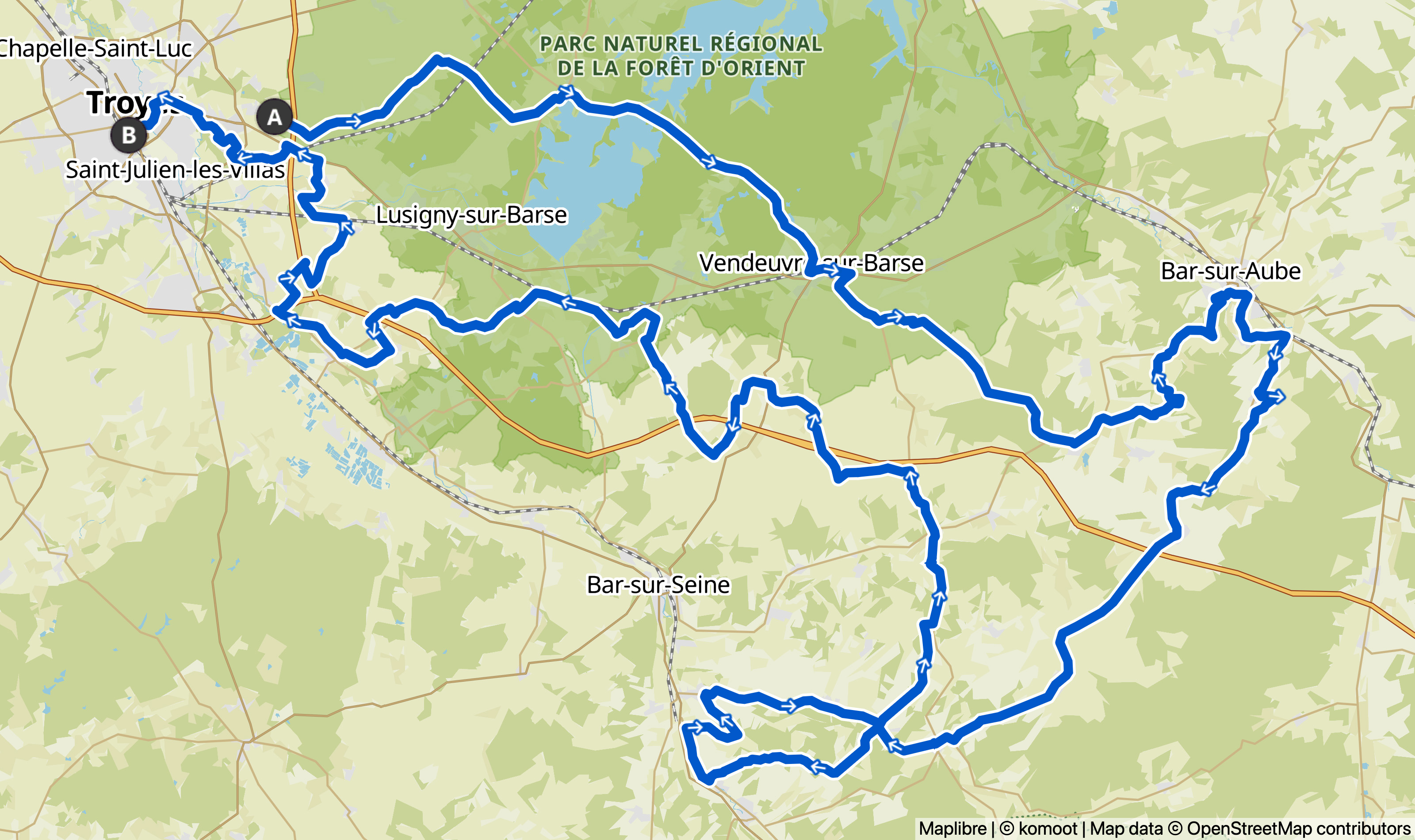The Tour's left-field turn: sampling stage nine of the Tour de France
Stage nine of the Tour de France, taking place on Sunday 7 July, features 32km on the white roads of the Champagne region. Steve Shrubsall grabs his gravel bike to sample what lies in wait for the peloton

The latest race content, interviews, features, reviews and expert buying guides, direct to your inbox!
You are now subscribed
Your newsletter sign-up was successful
Being the Tour de France race director must give Christian Prudhomme more than a few restless nights. In the small hours of a September morning – weeks before the following year’s route is announced to a clamouring crowd of riders, journalists and boulangerie proprietors – I imagine a panic-stricken Prudhomme coming to from a nightmare featuring the same old mountains and TT kilometres as the previous dozen editions. For a Tour de France route to be heralded a success, a more eclectic set of stages is needed – France needs to be well and truly toured. As many stones as possible need to be turned. And for this year’s route, the race director had a bona fide eureka moment.
OK, I’m not suggesting that the race director woke up one day screaming ‘GRAVEL!’ at the top of his lungs – but for the purposes of this feature, let’s run with it – because as an explanation of one particular stage, it fits the parcours perfectly. Barely out of his pyjamas, then, and long before the boulangerie proprietors, half of the pro peloton and a cluster of journalists had the chance to enquire as to what on earth he was raving about, stage nine of this year’s Tour had been signed, sealed and delivered. Fast-forward to mid-May 2024 and our CW team – me, my brother James and photographer Richard – were en route to find out for ourselves just what wild vision entered Prudhomme’s mind that fateful night.
Grappling with gravel
Our destination: the rolling Champagne region, where this year’s stage nine, on 7 July, will start and finish in the town of Troyes. Conjured in a moment of genius, Prudhomme and the Tour’s lead course designer, Thierry Gouvenou, inserted 14 gravel sectors covering 32km of the 199km stage. A brilliant move, unless you’re Remco Evenepoel who was frankly disgusted with the idea of including the chemins blancs in the 2024 Tour.

Brothers in arms at Monmartin-le-Haut,
The weather in the few days prior to our visit was hot and sunny – wall- to-wall sunshine in Troyes with afternoon highs of 24oC. Perfect. But after clicking the little arrow on the BBC Weather app that allows you to embark on a little time travel, we were regrettably informed that on the day of our arrival, and throughout our time there, the temperature would drop by some 10oC, the wind would pick up and, of course, it would rain. Oh, for the love of gravel...
After our first night in the Champagne region, we breakfasted on that classic Continental melange of meat, cheese and bread before heading to the start of the course just a few clicks out of the town. We rode amid cool weather and drizzle so fine it barely registered, our eyes instead feasting on the billiard-table-smooth roads – possibly resurfaced for the Tour’s pending arrival – a glorious lack of traffic, and a quite astounding landscape. Neat rows of pinot gris roll to the horizon, then back again; as if someone’s picked up the landscape like a carpet and shaken perfect waves into it.
So James I and pedalled away from Troyes and further into grape and gravel country. The good thing about riding with a sibling is they can lend you a tenner for an Orangina and a Camembert cob when you leave your wallet at the hotel. The bad thing about it is that there’s always a hint of an argument in the air. But the route thus far was so idyllic that we were enjoying one another’s company immensely, commenting on French countryside quirks and harking back to a holiday spent in the region back in... well, what seemed like light years ago.
There isn’t much to say about the first 50km aside from its aforementioned pretty, rolling nature, but then suddenly gravel happened. An unexpected prompt from my Garmin informed me that I would soon be taking a left turn. “I don’t see any left turns, do you?” I asked James. “Only that beaten-up path over there,” he replied.
The latest race content, interviews, features, reviews and expert buying guides, direct to your inbox!
Tools for the task
So it was that we entered the first gravel sector at breakneck speed, and Prudhomme’s dream was being realised – right here, right now. Then we stopped and consulted the map, just in case. Just about satisfied that this was indeed the right way and our Garmins hadn’t diverted us to Mordor, we continued. The tech beneath us about to be tested was, in James’s case, a Specialized Roubaix with hints of suspension in the fork and the seatpost and 32mm tyres; and beneath me, a Giant Revolt X Pro with 40mm of front travel, a dropper post and 42mm tyres.
Stage highlights
If you’re planning on heading over to France for a first-hand Tour experience, the gravel stage is the nearest to Blighty, with Troyes being just four hours by car from Calais. Here we’ve marked out the best places to watch the stage – but get there early, the hills in particular are premium vantage points.
Côte de Val Frion: This gravel sector could split the peloton or even prove a launchpad for a race-winning move. Expect a lot of jostling for position in the kilometres prior to this part of the course.
Côte de Chacenay: Steep gradients and gravel abound. If the Côte de Val Frion doesn’t get any bites, then the Côte de Chacenay, some 10 miles down the road, most certainly will. It’s rough, rugged and ridiculously steep.
The final 60km: With almost as much gravel as tarmac, the latter part of this stage will be a real treat to watch. Helicopter footage of riders ripping up rustic roads in the Champagne region could be some of the best at this year’s Tour.
If I was a betting man I’d say that when the Tour rides this stage, we are unlikely to see any of the peloton piloting gravel bikes. In fact, we’re unlikely to see anything even loosely resembling a gravel bike. Which is a shame, because this surface is perfect for them. Whereas before I’d assumed the Giant Revolt X had been designed for multi-surface endurance outings, it was now abundantly clear it had been designed specifically for this path.
I rocketed along, effortlessly displacing loose substrate as I rode. As the rain stopped and the sun toyed with the idea of putting its hat on, a certain amount of dust filled the air. We cut through a series of quintessential French villages with their bar-tabacs, boulangeries and charcuteries – none of which were open, of course.
Such was my appetite at this stage I could have propped up the local economy until the Tour arrived – but, alas the shops were closed, as usual, so we fished more gels from our pockets and found the next sector. Much like me with the gel, the Revolt gobbled up the fast, flat track under its wide, off-road tyres and begged for more of the same.
It was on the fourth and fifth sections of gravel that the ride became decidedly more bumpy. Now just over halfway through the stage, the rolling slopes had been replaced with far sharper, bracing gradients that if you’re built like me – regardless of the bike you ride – are a real sod to ascend. Sector 11 (they count down from 14 to one) comprises not only 3,429 metres of coarsely strewn gravel, but also the potentially peloton-splitting fourth-category ascent of the Côte de Val Frion.
We stopped at the top to catch our breath, and to speculate on what might transpire at this point during the race. “I think Matthieu van der Poel will attack here,” opined James, “and solo the next 90-odd kilometres back into Troyes.”
“Pogačar,” I retorted – largely because “Pogačar” was now my answer to any cycling-related queries. Who’s going to win the Tour? Pogačar. Who’s going to win the Worlds? Pogačar. Who’s going to win the 41st edition of the Jock Wadley Memorial Road Race? Pog– you get the idea. In seriousness, however much as it astounds me to think this, let alone write it in a national publication, I don’t think Pogačar will win this stage. My hunch is that James’s Van der Poel prediction is correct. That said, all of the Classics specialists in the race will have looked at this stage and run out of ink underlining it, so it’s by no means a foregone conclusion. This will be a hard-fought belter of a stage.

The chemins blancs will be perfect for puncheurs but purgatory for most GC men
White lightning
Having negotiated what we considered the decisive section of the day, the run-in to Troyes began. But hang on, we’d only ridden about 10 kilometres’ worth of gravel at this stage, so where was the rest of it? Right in front of us. Yes, the concluding kilometres of stage nine of this year’s Tour are almost exclusively composed of the rough stuff . Amazingly, the white paths (the literal translation of chemins blancs) fl ow one after the other – all the way to the city limits, with the fi nal six sectors all coming in the fi nal 33 kilometres.
First things fi rst, though – it was time for a Pogačar-esque attack. No, not just to upset James but because, after careful examination of stage nine’s Strava segments, I’d noted that each of the gravelly ones had only 80 or so previous entries on the leaderboard. It occurred to me that if I approached these with a high level of exuberance, I might come away with a shiny new crown. I’d need to go deep, though, very deep.
And so it began: I bid James bon voyage – I would be riding the next sector solo unless he had the inclination to join me in vying for the place of the fastest man in the French vineyards – and let rip. It wasn’t long before I was fizzing like a badly pulled pint of lager as grape farmers leapt from my path. One can only imagine the hushed conversations that took place in the bar-tabac that evening: “C’était... c’était... horrible!” As dishevelled as I looked and as poorly paced as this effort may have been, sheer will drove me on to the finish line on the Boulevard du 1er Ram in Troyes.

Map of the ninth stage of Tour de France
The location
How to get there
Troyes is only 110 miles south-east of Paris, so there’s the option of flying into the capital and then proceeding by train, car or even bike down to the Champagne town. Likewise, you could get the Eurostar into Paris from London. We chose to drive, which took just over four hours from Calais and was a very straightforward journey using toll roads.
Where to stay
So late in the day, it’s likely that all hotels in and around Troyes are already at capacity. However, looking on Airbnb there are ample options in Troyes and out on the course itself which would provide home from home comfort while experiencing the biggest annual sporting event on the planet. We stayed at the Hotel Kyriad where rooms start at £73 per night: Hotel Kyriad, 44 Av. Chomedey de Maisonneuve, 10000 Troyes, France (+33) 325452922.
Where to eat
This being France, there are myriad dining options and the food is almost always exceptional. The regional speciality, however, is andouiette – a sausage made from all the bits of a pig that often get hurried into the bin. Give it a try... but don’t blame us! We ate at Signorizza Troyes, a mid-tier Italian eatery, great for pre-ride carbo-loading. Signorizza Troyes: 42 Av. Chomedey de Maisonneuve, 10000 Troyes, France, (+33) 325761375.
Back at the hotel and after a demi- pression of bière blanche, I uploaded my ride to Strava in preparation of a ‘hey, look at me’-themed evening. Nothing. Not even a top 10. Just my luck that all the other riders on the leaderboard were WorldTour pros recceing the route. Stupid Tour de France.
Strava-segment hunting aside, this has all the makings of a stage for the ages. It will be ridden flat-out by the one-day specialists and endured with gritted teeth by the GC guys, notwithstanding a certain young man from Slovenia. With hints of Flanders, suggestions of Paris-Roubaix and positive wafts of Strade Bianche, this will be a stone cold Classic in the middle of the greatest Grand Tour of them all. So pour yourself a glass of bubbly, sit back and enjoy the show.
Steve has been writing (mainly fitness features) for Cycling Weekly for 11 years. His current riding inclination is to go long on gravel bikes... which melds nicely with a love of carbs